Psych-Out Blu-ray Movie
HomePsych-Out Blu-ray Movie 
Extended Director's CutOlive Films | 1968 | 101 min | Not rated | Feb 17, 2015
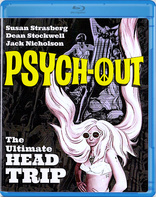
Movie rating
6.5 | / 10 |
Blu-ray rating
| Users | 0.0 | |
| Reviewer | 2.0 | |
| Overall | 2.0 |
Overview
Psych-Out (1968)
A deaf runaway arrives in San Francisco's Haight-Ashbury hippie district looking for her missing brother.
Starring: Susan Strasberg, Dean Stockwell, Jack Nicholson, Bruce Dern, Adam RoarkeDirector: Richard Rush
| Music | Uncertain |
| Drama | Uncertain |
| Thriller | Uncertain |
Specifications
Video
Video codec: MPEG-4 AVC
Video resolution: 1080p
Aspect ratio: 1.85:1
Original aspect ratio: 1.85:1
Audio
English: DTS-HD Master Audio 2.0
Subtitles
None
Discs
25GB Blu-ray Disc
Single disc (1 BD)
Playback
Region A (locked)
Review
Rating summary
| Movie | 2.0 | |
| Video | 3.0 | |
| Audio | 4.0 | |
| Extras | 0.0 | |
| Overall | 2.0 |
Psych-Out Blu-ray Movie Review
Bad trip, man.
Reviewed by Jeffrey Kauffman February 6, 2015For untold scores of Baby Boomers, the name Dick Clark meant only one of three things: 1) host of the seemingly immortal American Bandstand; 2) host of the only slightly less seemingly immortal Pyramid gameshow (in any of its monetary values); 3) host of the, yes, equally seemingly immortal New Year’s Rockin’ Eve telecast. But of course those who perused credits through the years were likely to see the Dick Clark brand show up as part of Dick Clark Productions, where that imprimatur helped to bolster any number of entries from music shows like Where the Action Is and Happening ‘68 to trophy fetes like The American Music Awards to talk, variety or comedy outings like Donny and Marie and TV’s Bloopers and Practical Jokes. Clark’s producing prowess was obviously protean, and yet as a big screen force, it never came close to equalling his impact on television. Clark got his feet wet in the film industry in 1968 with The Savage Seven and Psych-Out, a film which preceded The Savage Seven in cineplexes by a couple of months. Perhaps Clark’s newness to the vagaries of motion picture producing has at least something to do with Psych- Out’s somewhat inchoate feeling, but it’s arguable that that feeling of chaos lurking just beneath the surface may in fact have had as much to do with one of the subjects of the film itself: drug use. It’s not that hard to imagine the cast and crew of Psych-Out doing a bit (or perhaps more than merely a bit) of “field research” to inform their performances and/or crafts for this film, for even taking away the intentional hallucinatory and psychedelic elements of the film, there’s still a kind of bizarre stoned quality to much of the proceedings here. Unfortunately that “buzz” is not nearly enough to carry the film through its at times absurd posturing as it attempts to tell the tale of a gaggle of Flower Children in Haight Ashbury a bit after the Summer of Love had supposedly announced a new era of “harmony and understanding, sympathy and trust abounding” (to quote a certain Aquarian anthem of the day).
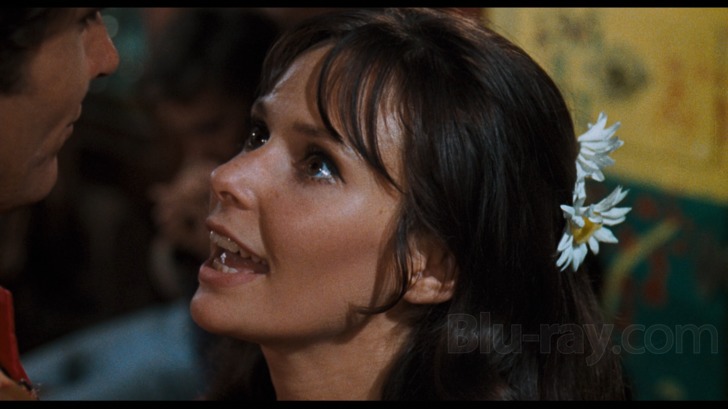
And in fact it’s that disconnect between the highs (literal or otherwise) of the Summer of Love circa 1967 and the depiction of the “hippie movement” in this film circa 1968 that proves to be one of Psych-Out’s biggest stumbling blocks. Despite the dilation of time that many drug infused folks probably experienced back in the day, things had changed rather dramatically in just the few months between the Summer of Love and Psych-Out’s release, to the point that the film probably already played like something of a self-parody back in 1968, a situation that’s only exacerbated by the ensuing decades. “Groovy” patois, wild patterned fabrics and other accoutrements of the era only tend to reinforce the perception that we’re watching a “recreation” done by behind the camera folks who were decidedly “square.”
Jenny Davis (Susan Strasberg), an apparently sweet “non hippie” type, shows up at Haight Ashbury and is evidently entranced by an impromptu street fair. Only when she fails to respond to a car driver manically honking his horn at her to get her out of the middle of the street does she divulge to the apopleptic guy that she’s deaf. Later, in a hippie hangout Jenny meets the members of a band named Mumblin’ Jim, including Stoney (Jack Nicholson), Ben (Adam Roarke) and Elwood (Max Julien). Stoney is decidedly un-PC in his treatment of Jenny, early on at least, “proving” to his buddies that she’s deaf (something he suspects almost immediately) by covering up his mouth when he talks so that Jenny can’t lip read. (Keep an eye on the interplay between Stoney and Ben. This may just be my over active imagination, but it sure looks like Nicholson and Roarke are engaging in a little "Method" madness to indicate there's perhaps a bit of a "relationship" between the two.)
It turns out Jenny is on the lam but also desperately in search of her artist brother Steve (Bruce Dern in a glorified cameo), a guy who has dropped a few too many hits of some chemical brew and evidently jumped head first off the deep end. Stoney and his buddies team up to help Jenny on her quest while at the same time keeping some nosy police types from catching up to the girl.
Interspersed with this supposed “through line” (which is appropriately “zig zaggy,” given the general hallucinatory nature of the film) are a number of unintentionally hilarious vignettes which include wonderful little bits like one guy freaking out on drugs, having visions that look like a low rent version of The Walking Dead, which lead to a potential disaster with a circular saw. There is also the requisite nod to rock music of the day, courtesy of bands like the Strawberry Alarm Clock and The Seeds.
It would be another year or so until filmmakers really seemed to capture the zeitgeist of the age with outings like Easy Rider (also available in America Lost and Found: The BBS Story). It’s to Dick Clark’s credit that he managed to appeal to counterculture types even when he was resolutely “square,” but Psych-Out probably required a more “experienced” (in a Jimi Hendrix kind of way) producer and/or director (Richard Rush) to really exploit some of the issues of the time. Psych-Out wants to pretend it’s offering something akin to a cinematic acid trip when really it’s just high on Geritol.
Psych-Out Blu-ray Movie, Video Quality 
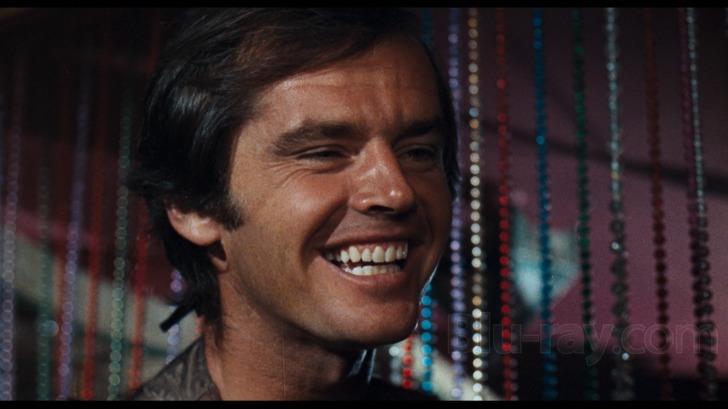
Psych-Out is presented on Blu-ray courtesy of Olive Films with an AVC encoded 1080p transfer in 1.85:1. Elements are in generally good shape, with relatively minor issues related to scratches and occasional minus density. While there's been a very slight fade toward brown, generally speaking colors are still nicely vivid and reasonably accurate looking, with blues looking especially good. Detail is often good as well, as in close-ups of Nicholson and Roark which reveal things like the corduroy ribbing on their shirts and vests. The biggest issue for some on this transfer will be grain management, which is occasionally problematic. There's a rather thick grain field to begin with here, one that is increased in optical sequences like the hallucination elements, but at times the grain will swarm over lighter backgrounds like whites or even blues, and in some of the darkest moments it acquires a slightly yellow appearance. That at least argues for the Olive model of no noise reduction, and there are similarly no signs of artificial sharpening.
Psych-Out Blu-ray Movie, Audio Quality 
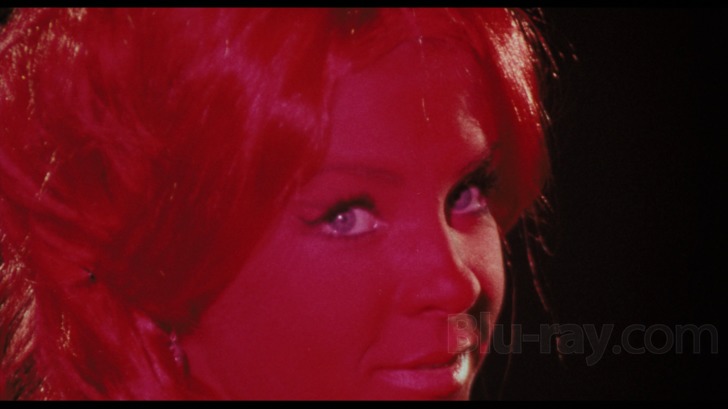
Psych-Out features a lossless DTS-HD Master Audio 2.0 Mono track which capably supports the film's sometimes hilariously "hip" dialogue and the enjoyable rock tunes that inform much of the aural landscape. Fidelity is excellent with no problems to report.
Psych-Out Blu-ray Movie, Special Features and Extras 
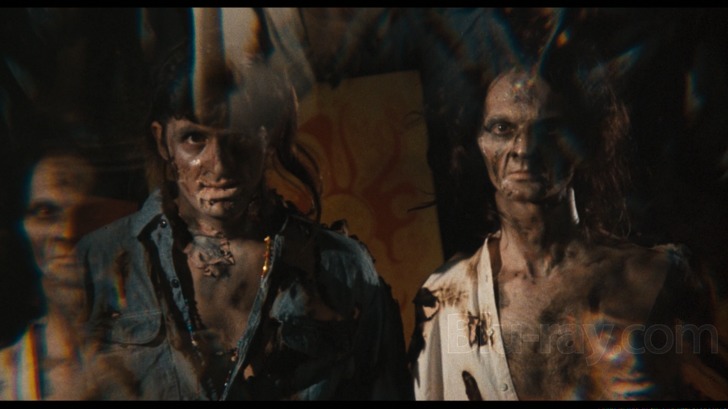
There are no supplements on this Blu-ray disc, despite the fact that the previous DVD release evidently included a documentary featuring Clark and others.
Psych-Out Blu-ray Movie, Overall Score and Recommendation 
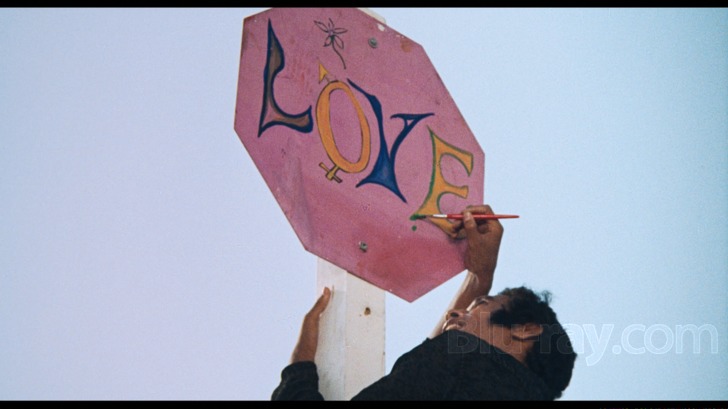
Psych-Out has a bit of camp value going for it, but it's a pretty inept attempt to cash in on what the creatives behind the film must have thought was a "hippie craze." An eclectic cast (to say the least) tends to mug incessantly through a variety of often silly vignettes that play like what the so-called Silent Majority probably thought "youngsters" acted. The soundtrack at least offers a few decent tunes. Video quality is generally fine but comes with some grain management issues, for those considering a purchase.
Similar titles
Similar titles you might also like

The Invaders: The Complete Series
1967-1968

Born Losers
1967

Extremities
1986

Inconceivable
2017

Scum of the Earth
1963

Special Effects
1984

Strait-Jacket
1964

Tuff Turf
1985

1BR
2019

Marrowbone
The Secret of Marrowbone
2017

Backcountry
2014

Grace
2009

Death Game [The Seducers] / Little Miss Innocence [Teenage Innocence]
1977

Lady in a Cage
1964

In the Folds of the Flesh
Nelle pieghe della carne | Standard Edition
1970

The Cycle Savages
Portrait of Violence
1969

Antrum: The Deadliest Film Ever Made
2018

'Gator Bait 4K
1973

Suture
1993

The Black Gestapo
Black Enforcers / Ghetto Warriors
1975